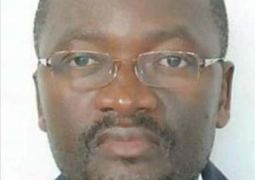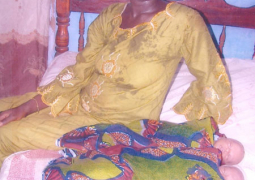Since the outbreak of Ebola in Guinea, Liberia, Sierra Leone and Nigeria, the health authorities in the United States have, admirably, been very calm and matter-of-fact in their advice to their citizens resident in, or visiting West Africa.
They have, clearly told Americans that Ebola can only be contracted by touching a person who has already been infected with, or died from, the disease. They say that “human to human transmission [of Ebola] is only achieved by physical contact with a person who is acutely and gravely ill from the Ebola virus, or their body fluids” and that such transmission “is almost exclusively among caregiver family members, or health care workers tending the very ill”.
The US embassy further advises “If you are walking around, you are not infectious to others. You cannot contract Ebola by handling money, buying local bread or swimming in a pool. There is no medical reason to stop flights, close borders, restrict travel or close embassies, businesses or schools..... You will not contract Ebola if you do not touch a person dying from Ebola.”
But while being so frank about how Ebola CANNOT be contracted, it appears the Americans have not quite levelled with the rest of the world – and especially the Governments of West Africa – about research that American scientists have been carrying out in Guinea, Liberia and Sierra Leone on haemorrhagic fevers including Lassa and Ebola, and which might accidentally spread Ebola if it goes wrong.
One report on the Internet headlined: “What are US Biological Warfare Researchers Doing in the Ebola Zone? By Jon Rappoport” (Global Research 2 Aug 2014 calls for:
QUOTE: ... “An immediate, thorough, and independent investigation of Tulane University [USA] researchers and their Fort Detrick associates in the US bio-warfare research community, who have been operating in West Africa during the past several years. What exactly have they been doing? Exactly what diagnostic tests have they been performing on citizens of Sierra Leone?
“Why do we have reports that the Sierra Leone Government has recently told Tulane researchers to stop this testing? Have Tulane researchers and their associates attempted any experimental treatments (e.g., injecting monoclonal antibodies) using citizens of the region? If so, what adverse events have occurred?
“The research program, occurring in Sierra Leone, the Republic of Guinea, and Liberia—... the epicentre of the 2014 Ebola outbreak—has the announced purpose, among others, of detecting the future use of fever-viruses as bio-weapons. Is this purely defensive research? Or as we have seen in the past, is this research being covertly used to develop offensive bio-weapons?
“For the last several years, researchers from Tulane University have been active in the African areas [Guinea, Sierra Leone and Liberia] where Ebola [has] broken out in 2014. These researchers are working with other institutions, one of which is USAMRIID, the US Army Medical Research Institute of Infectious Diseases, a well-known centre for bio-war research, located at Fort Detrick, Maryland.
“In Sierra Leone, the Tulane group has been researching new diagnostic tests for haemorrhagic fevers. [Note: Lassa Fever, Ebola, and other labels are applied to a spectrum of illness that result in haemorrhaging.] Tulane researchers have also been investigating the use of monoclonal antibodies as a treatment for these fevers—but not on-site in Africa, according to Tulane press releases. Here are excerpts from supporting documents. Tulane University, Oct. 12, 2012, “Dean’s Update: Update on Lassa Fever Research”:
“In 2009, researchers received a five-year $7,073,538 grant from the National Institute of Health to fund the continued development of detection kits for Lassa viral haemorrhagic fever. ...Since that time, much has been done to study the disease. Dr. Robert Garry, Professor of Microbiology and Immunology, and Dr. James Robinson, Professor of Pediatrics, have been involved in the research of Lassa fever.
Together the two have recently been able to create what are called human monoclonal antibodies. ... These antibodies have been tested on guinea pigs at The University of Texas Medical Branch in Galveston and shown to help prevent them from dying of Lassa fever… Most recently, a new Lassa fever ward is being constructed in Sierra Leone, at the Kenema Government Hospital. When finished, it will be better equipped to assist patients affected by the disease and will hopefully help to end the spread of it.” [The Kenema Hospital is one of the centres of the Ebola outbreak.]
“Here is another release from Tulane University, this one dated Oct. 18, 2007.: “New Test Moves Forward to Detect Bio-terrorism Threats.”
“The initial round of clinical testing has been completed for the first diagnostic test kits that will aid in bio-terrorism defence against a deadly viral disease. Tulane University researchers are collaborating in the project.
“Robert Garry, professor of microbiology and immunology at Tulane University, is principal investigator in a federally-funded study to develop new tests for viral haemorrhagic fevers. Corgenix Medical Corp., a worldwide developer and marketer of diagnostic test kits, announced that the first test kits for detection of haemorrhagic fever have competed initial clinical testing in West Africa.
“The kits, developed under a $3.8 million grant awarded by the National Institutes of Health, involve work by Corgenix in collaboration with Tulane University, the U.S. Army Medical Research Institute of Infectious Diseases, BioFactura Inc. and Autoimmune Technologies.
“Clinical reports from the studies in Sierra Leone continue to show amazing results,” says Robert Garry, professor of microbiology and immunology at the Tulane University School of Medicine...“We believe this remarkable collaboration will result in detection products that will truly have a meaningful impact on the healthcare in West Africa, but will also fill a badly needed gap in the bio-terrorism defence.…The clinical studies are being conducted at the Mano River Union Lassa Fever Network in Sierra Leone. Tulane, under contract with the World Health Organization,implements the program in the Mano River Union countries (Sierra Leone, Liberia and Guinea) to develop national and regional prevention and control strategies for Lassa fever and other important regional diseases....
“Clinical testing on the new recombinant technology demonstrates that our collaboration is working,” says Douglass Simpson, president of Corgenix. “We have combined the skills of different parties, resulting in development of some remarkable test kits in a surprisingly short period of time. As a group, we intend to expand this program to address other important infectious agents with both clinical health issues and threat of bio-terrorism such as Ebola.”
“The third document is found on the Sierra Leone Ministry of Health and SanitationFacebook page (no login required), dated [July 23, 2014] at 1:35pm. It lays out emergency measures to be taken. We find this curious statement: “Tulane University to stop Ebola testing during the current Ebola outbreak.”
Why? Are the tests issuing false results? Are they frightening the population? Have Tulane researchers done something to endanger public health?
“In addition to an investigation of these matters, another probe needs to be launched into all vaccine campaigns in the Ebola Zone. For example. HPV vaccine programs have been ongoing. Vials of vaccine must be tested to discover ALL ingredients. Additionally, it’s well known that giving vaccines to people whose immune systems are already severely compromised is dangerous and deadly.” UQUOTE
There are enough questions in this article for the US health authorities to issue an IMMEDIATE and TRUTHFUL statement on what Tulane University and its associates have been doing in the very region from which Ebola has currently broken out and is in danger of affecting many other countries. In the age of the Wikileaks and the Snowden leaks, it was remiss of the US Government not to anticipate that the research being done in Guinea, Sierra Leone and Liberia would be linked to the current Ebola outbreak> So it should a transparent statement to avoid panicking the populations of those countries and their neighbours.
The WHO must also tell the world what it knows about these tests in Sierra Leone, Guinea and Liberia and explain why it has not made the world aware of them up till now! Is WHO totally convinced that full ethical standards have been observed by the Tulane scientists during this outbreak, which WHO has classified as an “emergency”? Why are there, apparently, untested drugs to be used to cure Ebola available in the US, but nowhere else?
After all, there is a wealth of evidence to demonstrate that it is not altogether fanciful to suspect that HIV/Aids, for instance, was probably spread among humans initially by infected homosexuals in the US, and was brought to Africa by scientists who wished to find a cure for it. The WHO’s role in HIV/Aids research has not been transparently explained.
We need answers from the US Government and WHO.
NOW!
Guest opinion piece by Cameron Duodu obtained online from modernghana.com. Duodu is a well-known Ghanaian journalist who written commentary pieces regularly for, among others, the newsmagazine New African.
“We need the UN, to deal with the threats to our common security from nuclear, chemical and biological weapons, not only in the case of Iraq. They must be tackled by the international community together, by strengthening conventions, treaties and agreements”.
Anna Lindh



